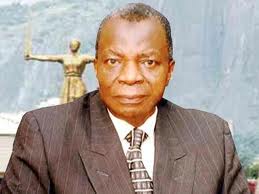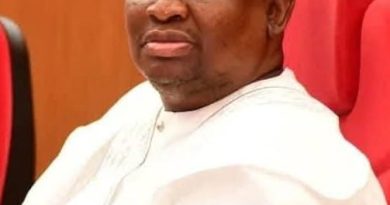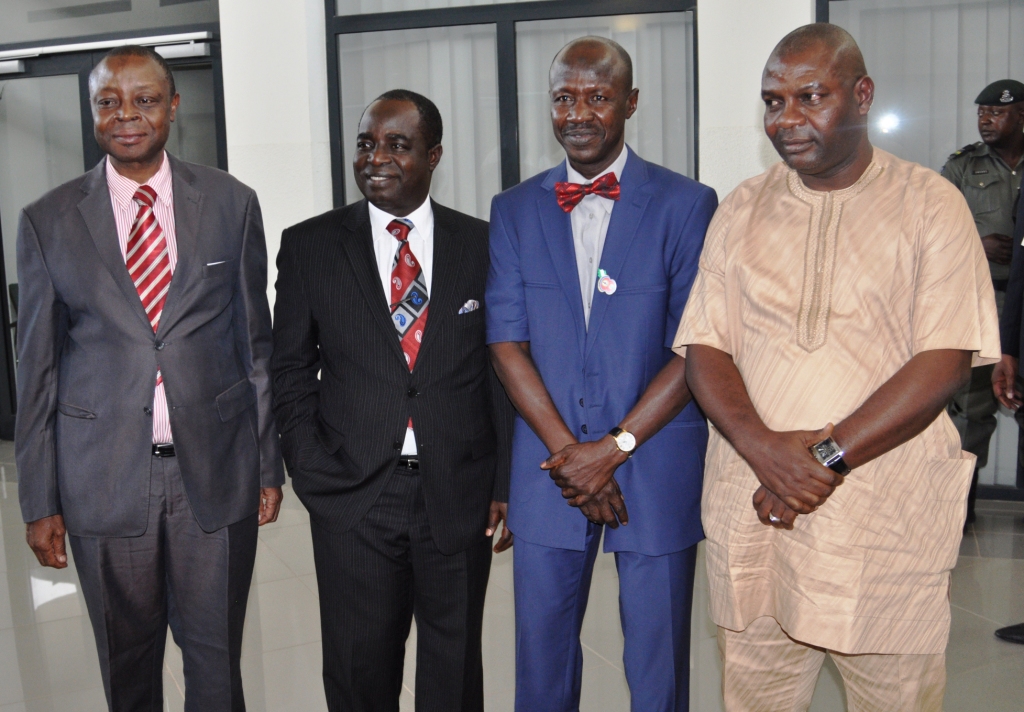SALAMI: OVERCOMING THE ARBSURDITY
Kayode Oladele
The non-implementation of the decision of the National Judicial Council (NJC) to recall the suspended President of the Court of Appeals, Justice Ayo Salami underscores the appalling intersection between politics and rule of law and the influence (or superiority?) of the former over the latter. Politics protects interest while the rule of law protects rights and it is generally believed that in the realm of things, a man would fight harder to protect his interest than he would to defend his rights. Therefore, when there is a clash between both, it is always accompanied by a host of paradoxes guided by parochial and insular tendencies.
To start with, there is no hope for the promotion of rule of law in Nigeria if law is not invoked automatically without political considerations or if the interpretation of law is made a subject of political expediency or group convenience. Therefore, from legal and constitutional standpoint, the controversy surrounding Justice Salami’s suspension and eventual reinstatement stems from the gravely erroneous assumption and absurdities created by the political interference in the work of the judiciary and the administration of justice in Nigeria. Hence, the only body to resolve the absurdity which has become one of the most vexed contemporary issues in Nigeria today is the NJC.
The absurdity does not arise from the Constitution because the Constitutional provision is very clear and unambiguous on the powers of the NJC to suspend a judicial officer. The reason, for this is simple: the framers of the Constitution in their bid to ensure the independence of the judiciary limits the powers of the president only to appointment and removal while creating special procedures for both. For instance, when the President wants to remove a judge on the recommendation of the NJC, he would send the request to the Senate for approval, the same way he would do for the confirmation of a judge. The framers of the Constitution knew that if the president has to be involved in everyday summary discipline of judges, the judiciary will become an appendage of the executive in addition to the fact that the President may have his own extra-judicial priorities and interests which can weigh very heavily in his decisions and ultimately impact judicial independence, obstruct justice and rule of law.
The power to suspend a judge under the 1999 Constitution (as amended) is vested on the NJC, not the President. The Constitution in the Third Schedule, Part 1 par 21 states that : ” the National Judicial Council shall have power- (b) to recommend to the president the removal from office of the judicial officers specified in sub-paragraph (a) of this paragraph, AND TO EXERCISE DISCIPLINARY CONTROL OVER SUCH OFFICERS ” (emphasis added).
What this boils down to mean is that the NJC does not have to involve the president in its decision to suspend or reinstate a judicial officer, beyond asking the president to appoint an acting President of the Court of Appeal ( if the judicial officer is the Chief Judge of the Federal high court, the President of the Court of Appeals like Justice Salami or the Chief Justice of the Federation) and formally notifying the President (the appointing authority) of its decision to reinstate for the purpose of stopping any further appointment in acting capacity bearing in mind that it is the same NJC that would also make the recommendation to the President for the continuity of the person so acting after the expiration of the initial period of 3o days in acting capacity if the judicial officer is still under suspension.
The legislature is aware that a person not occupying the position in substantive capacity does so temporarily, hence, makes such appointment renewable every ninety days in the hope that the suspension of the substantive holder will not constitute a permanent action. From that analysis, it is clear that the NJC enjoys a measure of independence and it is at liberty to make certain determinations including the discipline of judicial officers without notifying the President for his approval and it has done so for several years without executive intervention. So what the NJC did in the case of Justice Salami was to communicate its decision to the President who had already appointed someone t o act as the President of the Court of Appeals and to put the President on notice that renewal of the appointment of the acting President is no longer necessary. Otherwise, if Justice Salami had been a judicial officer not holding the position of the President of the Court of Appeals, the Chief Judge of the Federal High Court or the Chief Justice of the Federation, the NJC would not have been required to intimate the President of its routine disciplinary action.
What is therefore, happening now, that the President must approve the decision of the NJC to reinstate a judicial officer is not within the contemplation of the 1999 Constitution (as amended). Such an interpretation would amount to a brazen violation of the Constitution because the President does not have powers to do so under the principle of memo dat quon non habet . No one gives what he does not have and all acts, whether by the executive, legislature or judiciary must be in accordance with the law, not beyond their powers, to be legitimate and validly executed.
Unfortunately, the Presidency through the office of the Attorney-General of the Federation has given various reasons why the President would not “approve” the recommendation citing rule of law, subjudice and pending court cases challenging the NJC’s .action thus creating an impression that the NJC’s power of discipline of judicial officers under the 1999 Constitution (as amended) is subject to the approval of the President. If that position is true, where then is the separation of powers? With due respect, the Attorney-General’s position is preposterous without any legal support. Even assuming arguendo, that the President processes such powers, the pending cases are either moot and have become merely academic because there is longer an actual controversy for the Courts to determine by virtue of the reinstatement action by the NJC (if they were filed by Justice Salami himself) or of no consequence to the decision by the NJC to reinstate Salami pursuant to the powers conferred on it by the Constitution (if filed by interlopers and people without “locus standi” under the law).
According to Femi Falana, former President of West African Bar Association (WABA) while responding to this controversy in an interview with The Nation, one of the country’s leading newspapers: “If you look at the powers of the NJC; the NJC is empowered to investigate judges and exercise disciplinary control over them. But when it comes to removal or dismissal, it is the appointing authorities that can do that. It is like the Civil Service, if you are being investigated, you are interdicted and once the investigation is completed and nothing is found against you, that is the end of the matter. If he had been indicted, then the President would have been asked to remove him. It is the sole responsibility of the NJC and that is why I’m saying it has never happened in the history of Nigeria”.
Government must adhere to the provisions of the law if our claim to be a country governed by the rule of law is to be taken with any modicum of sincerity and respect by the international community. We cannot invent a Nigerian brand of rule of law and clog our judiciary with political actions and expect the world not to laugh at us. According to Prof. Emmanuel Omo Esiemokhai in his Article, “The Rule of Law in Nigeria”, “the rule of law is a shield against discrimination, xenophobia and other reactionary minded tendencies. Due process hinders those who want to cut corners in order to reap where they did not sow” quoting from the late justice Taylor in Olayori’s case, (1969), 2 All.N.L.R p.308 that ” if we are to have our actions guided and restrained in certain ways, for the benefit of the society in general and individual members in particular, then whatever status, whatever position we hold, we must succumb to the rule of law. The alternative is anarchy and chaos…”. That is what will make Nigeria a decent country (not a society of jesters) where the rule of law is sacrosanct. As the late Chief Justice Sir Adetokunbo Ademola would say, “as soon as you accept that man is governed by law and not by whims of man, it is the rule of law”.
The way forward? The United States v. Kirby, 74 U.S. 482 (1868)[, was a case in which the Supreme Court of the United States held that statutes must be construed reasonably and interpretations that promote absurdity must be avoided in order to avoid injustice and oppression. The Justices of the US Supreme Court held in the case “that all laws should receive a sensible construction,” and that literal interpretations which “lead to injustice, oppression, or an absurd consequence” should be avoided. The Court further held that “the common sense of man approves the judgment mentioned by Puffendorf, that the Bolognian law which enacted, “that whoever drew blood in the streets should be punished with the utmost severity,” did not extend to the surgeon who opened the vein of a person that fell down in the street in a fit. The same common sense accepts the ruling, cited by Plowden, that the statute of 1st Edward II, which enacts that a prisoner who breaks prison shall be guilty of felony, does not extend to a prisoner who breaks out when the prison is on fire – “for he is not to be hanged because he would not stay to be burnt.” That is an absurdity defined and how to resolve an absurdity in a nutshell.
However, as I noted earlier, there is no absurdity in the 1999 Constitution regarding the disciplinary powers of the NJC over judicial officers. The NJC in accordance with the Constitution had disciplined Justice Salami and invoking the same Constitutional provision, the NJC has decided to recall him. Technically speaking, Justice Salami has been recalled having concluded that the provision of the Constitution giving the NJC power to discipline a judicial officer is not subservient to the whims of the President and the NJC has exercised its power of recall. There is no absurdity in the NJC’s decision to notify the President, who is the appointing authority (of the President of the Court of Appeal) that it has recalled Justice Salami; the only absurdity, as I said earlier, being the misinterpretation of the NJC’s action by the political class. Once the NJC has decided to recall a suspended judicial officer in exercise of its powers under the Constitution that is the end of the matter and no further action is required to effect its decision.
The powers of the NJC in this regard have never been a subject of controversy until now when the political class have seen an opportunity to mucky the water for the NJC. Just like Femi Falana said, supra, “when there is a recommendation for removal of a judge, that is when the President or governor comes in because they are the appointing authorities. But with respect to investigation, it is the responsibility of the NJC to suspend and return a Judge if no indictment. ….. I have challenged any lawyer in Nigeria to show the provision of the Constitution that empowers the President to interfere or intervene in the investigation of a judge. There has not been a single instance where the President or the governor endorses suspension is established”. Falana’s position has not only been endorsed by the Nigerian Bar Association, the former Chief Justice of Nigeria, Hon. Justice Uwais, (Rtd), also stated in a recent interview with the Channels TV that “ the Chief Justice of Nigeria way back last year (2011) appointed a committee on Judicial Reform. I was the chairman and the committee recommended the reinstatement of Justice Salami and that is my position….from legal point of view, the suspension of a Judge, the power to do so is given to the National Judicial Council not the President…..once the NJC decides he should be recalled, then he should be recalled by the NJC, not the President”.
In conclusion, the NJC must take a principled approach with regard to the manifold stalemate being created by the political class and assert its power under the Constitution by sending a formal letter of reinstatement to Justice Salami directing him to resume his duties as the President of the Court of Appeals without any further delay. This is not only the Constitutional route and the intendment of the legislation, it is also just, fair and equitable. The controversy is not helping the image of Nigeria and any further delay in the implementation of its decision or anything done to give the coloration of executive approval of its disciplinary powers will demonstrate clear and blatant disregard for the concept of the independence of the judiciary and the rule of law in Nigeria.




